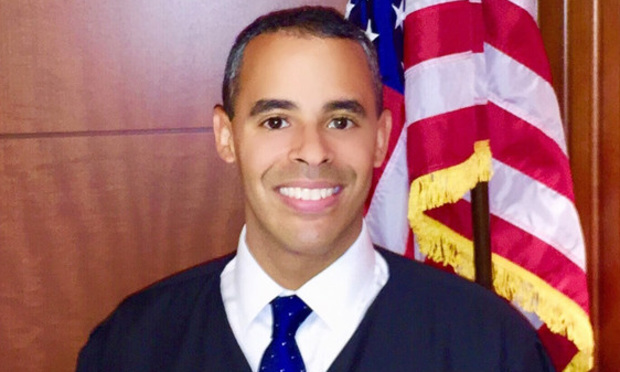New Report Details Atlanta Municipal Court's Successes, Remaining Challenges
Municipal Court Chief Judge Christopher Portis said one of the main complaints the task force heard about was the difficulty of simply getting someone to answer the phone.
May 30, 2019 at 01:41 PM
7 minute read
 Atlanta Municipal Court Building. Photo by Zachary D. Porter/Daily Report.
Atlanta Municipal Court Building. Photo by Zachary D. Porter/Daily Report.
More than a year after a massive cyberattack shut down the city of Atlanta computers and caused chaos at the Municipal Court, a new report by a Court Improvement Task Force says the court has rebounded with a streamlined website and is promising a more user-friendly experience for attendees and their lawyers.
But one of the most noticeable changes is also one of the most basic: People are answering the phones.
“One of the biggest issues we discovered was the correlation between court-users' experiences and the perception of our service as a whole,” Chief Judge Christopher Portis said.
“Getting real-time information is so important,” he said. “One of the biggest-ticket impacts is customer service: simply getting the phones answered.”
With a volume that sometimes topped 20,000 calls a month, the court's old system—four employees routing calls to assorted departments—often left callers on hold indefinitely, until they hung up in frustration or were disconnected.
A merger with the city's ATL311 information system last year helped bring that problem under control, Portis said, while solutions to other issues are still under review.
The 18-member Municipal Court Improvement Task Force was appointed last year by Portis and Deputy Chief Judge Christopher Ward, and co-chaired by attorneys George O. Lawson and Steven Weiner. It included members of the state and city justice systems, Atlanta city council members as well as other attorneys.
The report released last week lays out the goals and obstacles the court faces as it deals with more than 250,000 citations a year, and offered several recommendations for improving how it goes about its business in the future.
The task force centered on three key areas, including the court experience and how it interacts with the public; court outreach to ensure that resources are made available to offenders and their families to deter recidivism; and fixes to court procedures themselves to more efficiently move cases through the system.
One issue that's going to take more time depends on the outcome of Mayor Keisha Lance Bottoms' initiative to close and repurpose the Atlanta Detention Center.
 Atlanta Municipal Court Chief Judge Christopher Portis (Courtesy photo)
Atlanta Municipal Court Chief Judge Christopher Portis (Courtesy photo)Portis, who is among those just named to another task force exploring the uses for that property, said the closure shouldn't be a major problem for the court.
The jail population usually fluctuates between 70 and 100 inmates, according to a city Corrections Department spokeswoman.
Most of those defendants are jailed on charges involving drinking or drug offenses, drunk and disorderly conduct, or other relatively minor offenses.
“In any given calendar year, around 6% or 7% of our court cases are jail-related,” Portis said. “As far as day-to-day impact on the court, there shouldn't be a major correlation.”
Bottoms has ordered that Immigration and Customs Enforcement detainees no longer be held at the jail, and she signed legislation last year largely eliminating cash bonds for most offenses.
Portis said the latter move, combined with a focus on steering offenders toward accountability courts, rehabilitation and homeless services, should help relieve any strains.
“I am looking forward to the exchange of ideas coming from the [jail] task force,” he said.
“We're optimistic about addressing the critical issue of individuals who come into contact with the criminal justice system because they have quality-of-life issues,” Portis said. “We're going to come up with something very creative.”
Portis said the court has already moved toward steering defendants away from incarceration.
“We took the first major step in February, when we partnered with the Fulton County State Court to take DUI cases directly from Municipal Court to the county's DUI accountability court,” he said.
“That was a biggie for us, because we often see people who want and need treatment, and often it takes so long to get it, they've reoffended again. So now we can start and finalize it right here, and get down from two or three years to a few months.”
Atlanta's homeless, conservatively estimated at more than 3,000 individuals, make up a large share of the court's defendants, where in addition to substance and alcohol arrests they often face public urination, panhandling and nuisance charges.
The report recommends the creation of a Homeless Court, which would be established in conjunction with the American Bar Association's Commission on Homelessness and Poverty.
The voluntary court would combine a “progressive plea bargain system with an alternative sentencing structure,” and offer life skills training, substance abuse counseling and employment assistance, among other options, the report said.
“That's the remaining work in progress because it necessarily requires partnerships with agencies outside the traditional court processes,” Portis said.
“You kind of have three or four general issues that come up: mental health and substance abuse, of course; another is identifying temporary or permanent housing opportunities,” he said. “Then there's a subpopulation of veterans who need to be reconnected with veterans' services.
“We need a bank of partners to help us funnel these individuals through the court to agencies, so the court serves as a hand-holding body so they stay on track. If they fall by the wayside and end up reoffending, we want to break the cycle,” he added.
Another area the report deemed problematic is the court's high volume of no-shows, which for some criminal and traffic offenses can mean an automatic failure-to-appear warrant is issued.
The court has responded by offering expanded means to resolve outstanding cases, including offering a daily FTA docket and walk-in court.
“We have a rather robust operation that allows people to clear their FTAs all day, any day,” Portis said. “If they want a court date they can walk in and get one to see a judge. If it's a case where the fine was payable online, you can pay the FTA, and pay the fine at the window in one fell swoop.”
Some of the report's other recommendations are simpler: streamline court forms and documents so they can be easily downloaded and filled out by pro se litigants; appoint a constituent service manager to design and implement court staff training; and have courtroom officers deliver a uniform script at the beginning of each session to explain court procedures.
Of changes that have been made and the challenges ahead, Portis said he is particularly gratified at the absence of complaints from one particular source.
“On the heels of the cyberattack, the Mayor's Office of Constituent Services was a hotbed of complaints about the court,” he said. “Since August, there have been none.”
This content has been archived. It is available through our partners, LexisNexis® and Bloomberg Law.
To view this content, please continue to their sites.
Not a Lexis Subscriber?
Subscribe Now
Not a Bloomberg Law Subscriber?
Subscribe Now
NOT FOR REPRINT
© 2025 ALM Global, LLC, All Rights Reserved. Request academic re-use from www.copyright.com. All other uses, submit a request to [email protected]. For more information visit Asset & Logo Licensing.
You Might Like
View All
Law Firms Expand Scope of Immigration Expertise Amid Blitz of Trump Orders
6 minute read
Losses Mount at Morris Manning, but Departing Ex-Chair Stays Bullish About His Old Firm's Future
5 minute read
Bass Berry & Sims Relocates to Nashville Office Designed to Encourage Collaboration, Inclusion
4 minute read
Gunderson Dettmer Opens Atlanta Office With 3 Partners From Morris Manning
3 minute readTrending Stories
- 1An Eye on ‘De-Risking’: Chewing on Hot Topics in Litigation Funding With Jeffery Lula of GLS Capital
- 2Arguing Class Actions: With Friends Like These...
- 3How Some Elite Law Firms Are Growing Equity Partner Ranks Faster Than Others
- 4Fried Frank Partner Leaves for Paul Hastings to Start Tech Transactions Practice
- 5Stradley Ronon Welcomes Insurance Team From Mintz
Who Got The Work
J. Brugh Lower of Gibbons has entered an appearance for industrial equipment supplier Devco Corporation in a pending trademark infringement lawsuit. The suit, accusing the defendant of selling knock-off Graco products, was filed Dec. 18 in New Jersey District Court by Rivkin Radler on behalf of Graco Inc. and Graco Minnesota. The case, assigned to U.S. District Judge Zahid N. Quraishi, is 3:24-cv-11294, Graco Inc. et al v. Devco Corporation.
Who Got The Work
Rebecca Maller-Stein and Kent A. Yalowitz of Arnold & Porter Kaye Scholer have entered their appearances for Hanaco Venture Capital and its executives, Lior Prosor and David Frankel, in a pending securities lawsuit. The action, filed on Dec. 24 in New York Southern District Court by Zell, Aron & Co. on behalf of Goldeneye Advisors, accuses the defendants of negligently and fraudulently managing the plaintiff's $1 million investment. The case, assigned to U.S. District Judge Vernon S. Broderick, is 1:24-cv-09918, Goldeneye Advisors, LLC v. Hanaco Venture Capital, Ltd. et al.
Who Got The Work
Attorneys from A&O Shearman has stepped in as defense counsel for Toronto-Dominion Bank and other defendants in a pending securities class action. The suit, filed Dec. 11 in New York Southern District Court by Bleichmar Fonti & Auld, accuses the defendants of concealing the bank's 'pervasive' deficiencies in regards to its compliance with the Bank Secrecy Act and the quality of its anti-money laundering controls. The case, assigned to U.S. District Judge Arun Subramanian, is 1:24-cv-09445, Gonzalez v. The Toronto-Dominion Bank et al.
Who Got The Work
Crown Castle International, a Pennsylvania company providing shared communications infrastructure, has turned to Luke D. Wolf of Gordon Rees Scully Mansukhani to fend off a pending breach-of-contract lawsuit. The court action, filed Nov. 25 in Michigan Eastern District Court by Hooper Hathaway PC on behalf of The Town Residences LLC, accuses Crown Castle of failing to transfer approximately $30,000 in utility payments from T-Mobile in breach of a roof-top lease and assignment agreement. The case, assigned to U.S. District Judge Susan K. Declercq, is 2:24-cv-13131, The Town Residences LLC v. T-Mobile US, Inc. et al.
Who Got The Work
Wilfred P. Coronato and Daniel M. Schwartz of McCarter & English have stepped in as defense counsel to Electrolux Home Products Inc. in a pending product liability lawsuit. The court action, filed Nov. 26 in New York Eastern District Court by Poulos Lopiccolo PC and Nagel Rice LLP on behalf of David Stern, alleges that the defendant's refrigerators’ drawers and shelving repeatedly break and fall apart within months after purchase. The case, assigned to U.S. District Judge Joan M. Azrack, is 2:24-cv-08204, Stern v. Electrolux Home Products, Inc.
Featured Firms
Law Offices of Gary Martin Hays & Associates, P.C.
(470) 294-1674
Law Offices of Mark E. Salomone
(857) 444-6468
Smith & Hassler
(713) 739-1250






